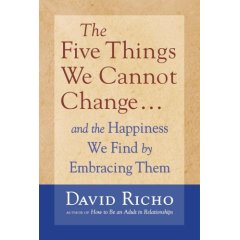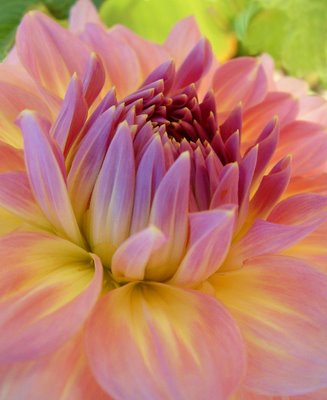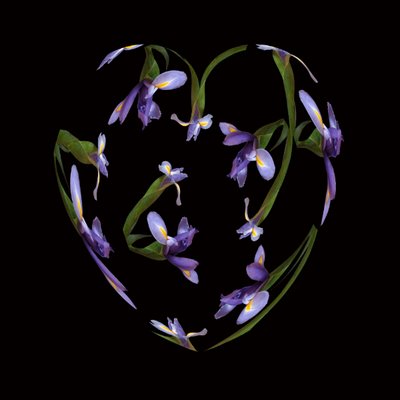 From 1000 Pictures
From 1000 Pictures Wednesday, February 28, 2007
How's your foundation?
If we are building upon something other than the truth, sooner or later our beliefs will collapse just like a building on a very weak and shaky foundation. I once heard a true story. Some men were constructing a magnificent building and they were well ahead in progress, when they realised that the foundations were not sure. Instead of continuing as some would, they proceeded to take all their hard work apart until they reached the foundation. They eventually completed the building which still stands magnificent today over 100 years later! Would you be willing to start from the beginning if you suspected your basic learning was all wrong? Would the building still be standing today if it had been constructed on a shaky foundation... The magnificent building was deconstructed before it fell down... If we are not mindful and continue to build upon our lack of certainty, we will fall down eventually. Is it not better that we start again before it happens when we least expect it?A reliable meditative practice will give us the courage and the stability to "deconstruct" our attitudes or beliefs or habitual tendencies so that we can build again on the foundation of truth.
Technical problems
Monday, February 26, 2007
More on mindfulness
Many of us spend all our time living in our past or fantasizing about our future, neither of which actually exist. We miss out on the one true experience of our lives, the gift of the present moment. It is the only thing that any of us can really possess in our lifetime. With each moment, with each breath, we have life. If we are breathing, we know we are alive! And when we are aware we are alive, we can find we have so much to celebrate. Sometimes we literally hold our breath. Other times, although we are breathing, we are doing so without any real awareness. If we do not breathe consciously, we are not aware that we are alive.Staying in the "now" is really the key to happiness. Paying attention to the breath and to what is available to us through our senses is a way to that mindfulness. And the more reminders we can get, the better.
So often we forget the gifts of our senses. Many of us have been blessed with sight, taste, touch, smell, and hearing, and each one of them gives us so much to enjoy. The gift of sight can be a daily celebration. Even if you are in a small office or a crowded city, you can look at your hand, at a flower, or at the sky. There is beauty all around us, just waiting for us to stop, take a few breaths, and appreciate it.
Sunday, February 25, 2007
Being a disciple
Disciples are responsible for themselves, knowing they are always in the process of growing and choosing to shape their personalities to serve their spiritual intentions. Disciples tend to be open, flexible, and teachable, inclusive in their worldview and dedicated to participating in the healing of planetary challenges. In the movie City of Joy, one of the characters says there are three ways to go through life: run, observe, or commit. Disciples commit.The meditative process can help us a lot with the commitment of discipleship because it will free our minds from their constant judging. Meditation helps us to become willing and open enough to be teachable.
Disciples are found everywhere and are identified by their being, not necessarily by their doing. Disciples tend to call forth the positive and the good in every circumstance. One by one they discipline their resources—body, mind, emotions, money, careers—and these resources become their servants, not their masters.
Disciples struggle under the weight of rules imposed by external authorities but gradually grow freer by their obedience to inner guidance.
Saturday, February 24, 2007
Bringing Our Secrets into the Light
We all have our secrets: thoughts, memories, feelings that we keep to ourselves. Often we think, "If people knew what I feel or think, they would not love me." These carefully kept secrets can do us much harm. They can make us feel guilty or ashamed and may lead us to self-rejection, depression, and even suicidal thoughts and actions.The meditative process teaches us that we can have a thought, we can accept it without judgment, we can let it go and then we can return to the meditative support - which brings us back to the present moment. This process will enable us to face our own secrets without undue distress and will, over time, teach us the courage we need to share those secrets with someone we trust.
One of the most important things we can do with our secrets is to share them in a safe place, with people we trust. When we have a good way to bring our secrets into the light and can look at them with others, we will quickly discover that we are not alone with our secrets and that our trusting friends will love us more deeply and more intimately than before. Bringing our secrets into the light creates community and inner healing. As a result of sharing secrets, not only will others love us better but we will love ourselves more fully.
Friday, February 23, 2007
Observer consciousness
So when you listen to a thought, you are aware not only of the thought but also of yourself as the witness of the thought. A new dimension of consciousness has come in. As you listen to the thought, you feel a conscious presence - your deeper self - behind or underneath the thought, as it were. The thought then loses its power over you and quickly subsides, because you are no longer energizing the mind through identification with it. This is the beginning of the end of involuntary and compulsive thinking.When a thought subsides, you experience a discontinuity in the mental stream - a gap of “no-mind.” At first, the gaps will be short, a few seconds perhaps, but gradually they will become longer. When these gaps occur, you feel a certain stillness and peace inside you. This is the beginning of your natural state of felt oneness with Being, which is usually obscured by the mind. With practice, the sense of stillness and peace will deepen. In fact, there is no end to its depth. You will also feel a subtle emanation of joy arising from deep within: the joy of Being.You can experience what Eckhart Tolle is talking about by choosing not to identify with your thoughts. You have thoughts but you're not your thoughts.
Thursday, February 22, 2007
Thursday life form blogging
These animals are rare and continue to decline, extinct in 4 of the 7 Chinese provinces where originally found.
Do rituals
Rituals are a central part of life whether it be in how meals are shared together, or how major events are marked...Rituals give us places to be playful, to explore the meaning of our lives, and to rework and rebuild family relationships. They connect us with our past, define our present life, and show us a path to our future as we pass on ceremonies, traditions, objects, symbols, and ways of being with each other, handed down from previous generations.Reflection question:
Name the one ritual - religious, family, or personal - that means the most to you. Why is it so significant?A ritual need not be fancy or elaborate to qualify as meaningful. One of the most meaningful rituals in my daily life is my care for my dog in the morning. She loves the ritual as well and knows exactly what part comes next in our routine. It's a reference point for my daily goings about and it gives me much pleasure to see how happy it makes my dog.
Wednesday, February 21, 2007
Letting go
This is a path of letting go
so there will be room to live.
If we hold on to our opinions,
our minds will become dull and useless.
Let go of opinions.
If we hold on to possessions,
we will always be at risk.
Let go of possessions.
If we hold on to ego,
we will continue to suffer.
Let go of ego.
Working without thought of praise or blame
is the way of true contentment.
This is a path of letting go
so there will be room to live.
Tuesday, February 20, 2007
Relax with incense
In the brain the processing of smell is closely linked with memory retrieval, so that a smell can act as a powerful trigger for a memory and therfore a mood. This makes it possible to prime calm states of mind using certain scents - helpful when preparing for meditation. Perform this exercise for the first time when you are already feeling calm. Sit comfortably, light some incense and close your eyes. As you breathe, focus your awareness on the smell of the incense as it enters your nostrils during each inhalation. Visualize the smell as a beautiful light, flooding your body with liquid calm. Continue for at least five minutes. Perform this exercise at the start of your meditation practice if you are feeling agitated. Not only will it be calming in itself, but it will also trigger memories of the calm that you experienced the first time around.It's worth it to take the trouble to experiment with different kinds of incense to find the scent that really works for you. You can also light it for just a little time (and then snuff it out) so that the scent is quite subtle. This is often a good plan if the usual amount of incense bothers you.
Monday, February 19, 2007
The original mind
About this mind... In truth there is nothing really wrong with it. It is intrinsically pure. Within itself it's already peaceful. That the mind is not peaceful these days is because it follows moods. The real mind doesn't have anything to it, it is simply (an aspect of) Nature. It becomes peaceful or agitated because moods deceive it. The untrained mind is stupid. Sense impressions come and trick it into happiness, suffering, gladness and sorrow, but the mind's true nature is none of those things. That gladness or sadness is not the mind, but only a mood coming to deceive us. The untrained mind gets lost and follows these things, it forgets itself. Then we think that it is we who are upset or at ease or whatever.It is really very reassuring to be told that there is nothing wrong with the mind - the real mind, that is. There's nothing to "fix". All we need to do is see what's really there. Wonderful!
But really this mind of ours is already unmoving and peaceful... really peaceful! Just like a leaf which is still as long as no wind blows. If a wind comes up the leaf flutters. The fluttering is due to the wind -- the "fluttering" is due to those sense impressions; the mind follows them. If it doesn't follow them, it doesn't "flutter." If we know fully the true nature of sense impressions we will be unmoved.
Our practice is simply to see the Original Mind. So we must train the mind to know those sense impressions, and not get lost in them. To make it peaceful. Just this is the aim of all this difficult practice we put ourselves through.
Sunday, February 18, 2007
Listen to the Exhortation of the Dawn!
Look to this Day!
For it is Life, the very Life of Life.
In its brief course lie all the
Verities and Realities of your Existence.
The Bliss of Growth,
The Glory of Action,
The Splendor of Beauty;
For Yesterday is but a Dream,
And To-morrow is only a Vision;
But To-day well lived makes
Every Yesterday a Dream of Happiness,
And every Tomorrow a Vision of Hope.
Look well therefore to this Day!
Such is the Salutation of the Dawn!-- Kalidasa
Friday, February 16, 2007
No Saturday blogging
Blessings to all!
New Harvard report
BOSTON, Feb. 14 /PRNewswire-USNewswire/ -- Exercises that elicit the relaxation response can help your body erase the cumulative effects of stress, according to "Stress Management: Techniques for Preventing and Easing Stress," a new report from Harvard Medical School. The report explains that stress has been linked with such physical problems as heart attack, stroke, gastrointestinal problems and asthma, as well as emotional problems like depression, anxiety and an inability to enjoy life.Common sense, people. Common sense!
The relaxation response, the opposite of the stress response, is a state of profound rest and release. A number of physiological changes occur during the relaxation response. When a person meditates, for example, heartbeat and respiration slow down. The body uses less oxygen and produces less carbon dioxide. Blood lactate levels, which some researchers believe are linked with anxiety attacks, decline markedly. Blood pressure tends to stabilize in healthy individuals and drop significantly in people with hypertension. Studies have shown that this decrease in blood pressure persists with regular meditation.
Meditation is only one way to elicit the relaxation response. Other methods include deep breathing exercises, yoga, tai chi and repetitive prayer. What's crucial is that the method enables a person to interrupt everyday thoughts by focusing on a word, phrase, prayer or repetitive muscular activity. The report recommends practicing relaxation techniques once or twice a day, for a total of 10 to 20 minutes daily. Evidence suggests the more often a person practices these techniques, the better the outcome.
Thursday, February 15, 2007
Growing in wisdom
Many world tales and perennial wisdoms point to eight metaphorical gates of initiation through which we must pass in order to develop fully into wise people, or elders. These gates are archetypal passageways to deepening our experience of life in our later years. They offer powerful tools to help us shift our perspective. They map a new landscape for the second half of life, grounded in multicultural traditions that honor elders. . . .It always bothers me when people in our culture act as if growing older is something to be denied and that saying "You're not old!" is a compliment. We are supposed to grow old. That is the goal - not something to be warded off and resisted. If we train ourselves to be comfortable with the idea of growing old then we will be open enough to grow in wisdom as well.
The lessons offered at each of the eight gates rigorously prepare us for our initiation into elderhood. The Silver Gate challenges us to invite new experiences into our lives. The White Picket Gate asks us to reflect on the roles we have played earlier in life, and learn to assume the new role of elder. The Clay Gate urges us to care for and enjoy our bodies, even as we come to terms with their limitations. At the Black and White Gate we learn to deepen our relationships in more intimate and mature ways. The Rustic Gate encourages us to use our creativity to enhance our lives, contribute to our communities, and leave a lasting legacy. At the Bone Gate, we develop the courage to be authentically ourselves in the world. The Natural Gate calls us to replenish our souls in silence and in nature and to take time for reflection. When we reach the Gold Gate, we actively engage in practices of nonattachment and prepare for our passing from this world.
Wednesday, February 14, 2007
Happy Valentine's Day!
Love is patient, love is kind.
It does not envy, it does not boast, it is not proud.
It is not rude, it is not self-seeking.
It is not easily angered, it keeps no record of wrongs.
Love does not delight in evil, but rejoices with the truth.
It always protects, always trusts, always hopes, always perseveres.
Love never fails.
Tuesday, February 13, 2007
The importance of listening
[There] is the age-old notion that when holding a shell to your ear, you can hear the ocean. It always seems to work. The scrutiny of medicine has revealed that when you hold that shell to your ear, you actually hear your own pulsations, the ocean of your blood being played back to you. Yet this fact does not diminish this mystery. It only enhances it. For holding a shell to our ear teaches us how to hear the Whole through the part, and how to find the Universe within us. It teaches us that when we dare to hold another being, like a shell, to our ear, we hear both the mystery of all life and the ocean of our own blood.-- from The Exquisite Risk: Daring to Live An Authentic Life by Mark Nepo
Amazingly, each being has the story of the Universe encoded within them. Each soul is a shell shaped by the currents of the deep. Even physically, the inner ear — that delicate source of balance — is shaped like a conch. And so, whatever is held and listened to will show us where it lives in the world and in us.
Monday, February 12, 2007
Words That Feed Us
When we talk to one another, we often talk about what happened, what we are doing, or what we plan to do. Often we say, "What's up?" and we encourage one another to share the details of our daily lives. But often we want to hear something else. We want to hear, "I've been thinking of you today," or "I missed you," or "I wish you were here," or "I really love you." It is not always easy to say these words, but such words can deepen our bonds with one another.The meditative process helps us know ourselves deeply and thoroughly. Such self-knowledge gives us the courage to be vulnerable enough to offer words of affirmation and love to those we connect with often.
Telling someone "I love you" in whatever way is always delivering good news. Nobody will respond by saying, "Well, I knew that already, you don't have to say it again"! Words of love and affirmation are like bread. We need them each day, over and over. They keep us alive inside.
Sunday, February 11, 2007
Sunday prayer blogging
Today I purpose to live
My life will shine
As the morning sings
I walk in liberty
Bound in true dreams
Manifested promises
Chase my forward motion
A covered path before me
The fruits of my hoping
The fruits of my living
Today I purpose to love
My love will speak
With the sound of grace
Merciful within mercy
The works of my faith
Smiles of overflowing
Inspire my giving
Abundance of joy as rain
The fruits of my living
Saturday, February 10, 2007
Cultivating happiness
Make a list of things that make you happy. Write them as they occur to you or as you notice your enjoyment in an activity. Challenge yourself to come up with at least 100 ideas. Then resolve to do at least three of those things each day for the next three weeks.I think that's a very good idea --- to make such a list. Most of us would need to get creative in order to come up with 100 things and that's all to the good. I imagine we'd think of things that we normally wouldn't consider. With the list in hand, it will be easier not to neglect those activities that promote happiness.
Friday, February 09, 2007
Elder's Meditation of the Day
"It can be 100 degrees in the shade one afternoon and suddenly there comes a storm with hailstones as big as golf balls, the prairie is all white and your teeth chatter. That's good-a reminder that you are just a small particle of nature, not so powerful as you think."
--Lame Deer, LAKOTA
No event, no relationship, no joy, no sadness, no situation ever stays the same. Every setback is only temporary. Even setbacks change. Why? Because the Great Spirit designed the world to be constantly changing. We are not the center of the universe, we are but a small part. The whole is constantly changing, and we as humans are constantly participating in the change. We have two choices, to resist change or participate in the change. Every change can be resisted, and every change can be made in cooperation. What will I choose today, resistance or cooperation?
Great Spirit, teach me to make cooperative changes.
Thursday, February 08, 2007
Valuing all great religions
Adherents of different faith traditions can come together with great success through meditation. The mind works the way the mind works. This is true for all of us regardless of our belief system.I believe in the fundamental truth of all great religions of the world. I believe that they are all God-given and I believe that they were necessary for the people to whom these religions were revealed. And I believe that if only we could all of us read the scriptures of the different faiths from the standpoints of the followers of these faiths, we should find that they were at bottom all one and were all helpful to one another.
Wednesday, February 07, 2007
Things we cannot change

I want to recommend a book that I talked about in the ongoing classes this week. It's called The Five Things We Cannot Change... by David Richo. Here's an excerpt from the description on Amazon:
There are certain facts of life that we cannot change—the unavoidable "givens" of human existence: (1) everything changes and ends, (2) things do not always go according to plan, (3) life is not always fair, (4) pain is a part of life, and (5) people are not loving and loyal all the time. Richo shows us that by dropping our deep-seated resistance to these givens, we can find liberation and discover the true richness that life has to offer. Blending Western psychology and Eastern spirituality, including practical exercises, Richo shows us how to open up to our lives—including to what is frightening, painful, or disappointing—and discover our greatest gifts.When you think about it, each of these five things is clearly observable. Richo says it is the ego that fights against these realities and tries to get around them. Learning to accept and also to appreciate each of these givens will truly liberate us. We can appreciate them by using the insight they give us to cultivate both courage and compassion.
UPDATE: Just found this and I think it's in keeping with the above:
If you can't solve it, it's not a problem--it's reality.
Tuesday, February 06, 2007
More on pain
Mindfulness meditation trains us to be less reactive to whatever it is in life that causes us suffering. It gives us an ability to experience our own pain without identifying fully with it, and therefore to be more free from it. Because of that experience during meditation, we begin to fear life's pain less, to contract around it less. We become more easygoing with ourselves. We still suffer, but with much less of the dramatic flair that only adds to our suffering and makes it overwhelming.
Reduce your pain
MRI, as some of you may know, is a noninvasive imaging test that uses magnetic energy to take three-dimensional pictures of internal body organs. "Functional" MRI is a new application of MRI, in which you can see how blood flow to the brain changes as you think; it is a way to monitor brain activity.40 to 50 percent. That's a lot. If that's not a good motivation to practice, I don't know what is!
In the research study, when 12 people who were skilled at meditation were examined using functional MRI, they had a 40 to 50 percent lower brain response to pain than 12 people who had never done meditation.
Monday, February 05, 2007
Time for meditation
And that is true. As many of you know, I used to work for Desmond Tutu when he was Archbishop of Cape Town. I never met a busier person. And yet he never missed his hour of meditation in the morning. He almost always got to chapel before I did each morning! Then we would simply sit in silence together until it was time for community prayers. He is a man of great passion but also of great equanimity. And he never skipped his daily meditation because he was "too busy".A story has been told about a businessman and a bishop. The businessman approached the saintly bishop and inquired, "What is the secret of your being able to accomplish so much each day and with such a spirit of serenity?"
The good bishop answered, "My friend, add to each morning's prayer at least half an hour more of meditation and not only will you be able to accomplish peacefully all that needs to be done for the day but you will even find extra time for other things."
Sunday, February 04, 2007
It's for busy people
Here's an article about a meditation teacher in Australia named Ajahn Brahmavamso. Take a look at this excerpt:
With so much of talk about everyone being busy, Ajahn Brahm insisted that meditation is ideal for busy people. “Even if you are a busy person, it is more important to be able to spend some time being peaceful. If you don't learn how to be peaceful, you soon get very, very tired.”Meditation really does rest the mind if you do it correctly - that is, without strain or inner tension. It's a false economy indeed to "save time" by not meditating because meditation makes you more effective and efficient so that the time you have is put to better use.
To explain how meditation helps you, he used a simple exercise lifting the half-filled glass of water he had in front of him. "Say I am lifting up this glass of water and you ask me how heavy it is. If I keep holding the glass of water for five minutes, it appears quite heavy. If I continue to hold the glass for half an hour, I will be in quite a lot of pain. If I keep on holding it for two hours, I would be a stupid monk. When it starts to get heavy, what should I do? Put it down — let it go. I don't need to throw the glass of water away — I just put it down for, may be for 20 seconds. When I pick it up again, it feels lighter because I have rested.
“The problem of stress in our modern world is not because we do too much — it's because we don't know how to put our burdens, our responsibilities down for a few minutes and rest and relax. All we need to do is to rest for 15 or 20 minutes in meditation and afterwards we find ourselves so relaxed, we can carry the burdens of life without so much stress. That is what meditation is — learning how to relax so that you can do more with less stress,” he said.
Saturday, February 03, 2007
Friday, February 02, 2007
True wisdom
To be interested in the changing seasons is a happier state of mind than to be hopelessly in love with spring.
Thursday, February 01, 2007
Valuing those we meet
Our individual journeys take us into many unexpected situations where we encounter a wide variety of people-some quite like ourselves and some very different. We cannot anticipate these meetings, but we can make the most of them when they take place. When we are courteous as a matter of course and open-minded in our assessment of the individuals whose lives briefly touch our own, we are more apt to stumble upon surprising gems of wisdom that open our eyes to new worlds of possibility. Every person we meet can affect us profoundly, just as every situation we find ourselves in can teach us something new.It's easy to go through the day taking people for granted. Simply paying attention is the key to interrupting that habitual tendency. Opportunities are all around us. We simply need to open our eyes - and our hearts.
...
When we are cognizant of the potential for unexpected enlightenment, we make a habit of turning strangers into friends, thus ensuring that we are never without a font of wisdom from which to draw.




 From 1000 Pictures
From 1000 Pictures






 From 1000 Pictures
From 1000 Pictures